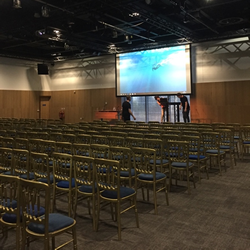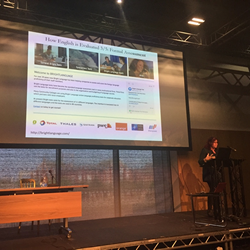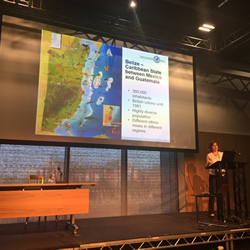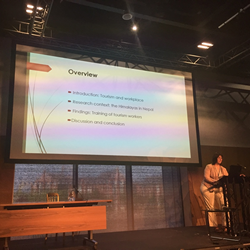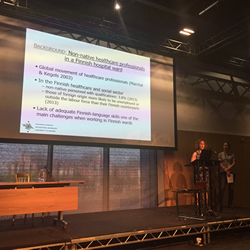Melissa Moyer and Gema Rubio Carbonero convene a panel titled Multilingualism, Mobility and Work at IPrA in Belfast, Northern Ireland on July 16-21, 2017 with a discussion led by the chair Jan Öla-Östman from Helsinki University.
The theme of this panel is multilingual language practices in connection to the new work order that is being shaped by the mobility of persons to different locations across the globe. Mobility for purposes of work (including non-work related mobility, such as for reasons of life experience, leisure or study) is taken as a central element for understanding social processes involving social structuration and exclusion where multilingualism and other language practices –both oral and written– have become key in the realization of work tasks but also in the production and marketing of a product or service (Agha 2011). Nowadays, emphasis is placed on language and talk in this new economic order that Heller (2003) has coined as the new word-force. Language, both the manner in which it is used in work interactions (Sarangi and Roberts 1999) as well as the knowledge of a bounded system of communication used by a given community of speakers, is a skill required of workers by employers but also more importantly a personal trait of the individual (Urciouli 2008). The added value –for an individual or a business– provided by knowing a particular language or being able to speak in a particular way (Duchêne and Heller 2012) or the manner in which the language of workers gets regimented (Cameron 2000) for certain types of work are not strictly new developments in the field but they do represent alternative perspectives to earlier approaches where language in the workplace was considered a static variety associated with specific work domains or professional roles. The purpose of this panel is to contribute to current understanding of mobility and work from a social, linguistic, and pragmatic perspective. This multidisciplinary perspective that takes into account social processes and realities that have developed more recently as the outcome of an increasingly globalized and diverse world shaped by a dominant neo-liberal economic order. The focus on language and multilingual practices is essential for understanding the ways relevant social actors construct relations of power and exclusión through their multilingual language practuces.
The full program of the panel is available here:
Jacqueline (Jackie) Militello (University of Hong Kong), First Impressions Are Lasting Impressions: Small Talk As An Index Of Identity Within Elite Job Interviews.
Gema Rubio Carbonero, Ann Klimava & Melissa Moyer (Univesitat Autònoma de Barcelona), English in Job Recruiting: An Added Value?
Britta Schneider (Freie Universität Berlin), Linguistic Immobility on a Global Job Market – Postcolonial Language Ideologies in the Tourism Industry of Belize.
Bal Krishna Sharma, (University Idaho), Regimentation of Intercultural Communication Skills and the Training Tourism Workers in the Himalayas.
Inkeri Lehtimaja (Aalto University), Salla Kurhila, Johanna Komppa & Lari Kotilainen (University of Helsinki), Language Use At A Hospital Ward – An Ecological Perspective on Professional Language Proficiency.
Here you can also browse some of the photos from the presentations:
Dr. Eva Codó convened a panel titled The Neoliberalization of Educational Systems: Englishization Policies and the Creation of Flexible Workers at IPrA in Belfast, Northern Ireland on July 16-21, 2017 where she also presented a paper entitled English and Contemporary Regimes of Precarization: What Ethnographies of CLIL Reveal.
This panel seeks to gain a critical understanding of the process of intensification of English-medium instruction (EMI) in different parts of the world. The objective of the panel is two-fold. First, it aims to tie Englishization policies and practices to the marketizing and neoliberalizing agenda of contemporary school systems whose objective is the creation of productive workers who can enhance the global competitiveness of national economies. Lo Bianco (2014) has argued that the status of English in the school curricula is changing in that it has entered the set of basic skills all kids should acquire and is disappearing as a separate discipline. This is part and parcel of the training of students for the service economy, which requires soft and relational skills, and of the technicist drive in education (Hill & Kumar, 2009), which favours professional, transversal and transferrable skills (Hirrt, 2009). Secondly, the panel aims to explore the effects of the whole-heartedly embracing of EMI on the flexibilization (and precarization) of the teaching profession, following the work of scholars like Urciouli (2008), who has investigated the skillification of contemporary labour. This political economic perspective is largely absent from EMI studies, and follows pleas by Block, Gray and Holborrow (2012) and Ricento (2015), among others, to adopt a more interdisciplinary and materialist approach to applied linguistics.
The panel is innovative in two ways. First, it aims to compare ethnographic data from distinct state contexts and educational levels. Scholars working on Catalonia (Spain), the Philippines and Sweden and who are doing research on secondary and tertiary education have been invited. Secondly, the panel tries to dissect the intertwining of English policies and labour issues from different angles. One set of papers will focus on deciphering what types of ideal students these policies aim to produce and with what consequences for whom. One of the papers will investigate the ideological underpinnings and consequences of an ongoing educational reform in the Philippines aimed to introduce vocational training early in secondary education in order to produce employable workers. It is expected that this reform will further intensify EMI. Another of the papers will discuss how EMI in Sweden became more prevalent after a reform in the early 1990s that gave schools more freedom to introduce different forms of instruction, as well as the possibility to marketize educational options. It will also deconstruct stakeholders’ views of English a way to ensure students’ successful professional careers imagined in a competitive global context. A third paper will investigate the entrepreneurial ethos and self-skilling practices of EMI teachers working in the public educational sector in Barcelona, Spain, who decide to “volunteer” to teach their courses in English as a way of trying to secure a permanent job. Finally, the fourth paper will present an auto-ethnography of an instructor in an English-medium teacher training program who challenged her students’ naturalized discourses about English as the ultimate commodity.
For more information about the conference please go to the official IPrA web-page
